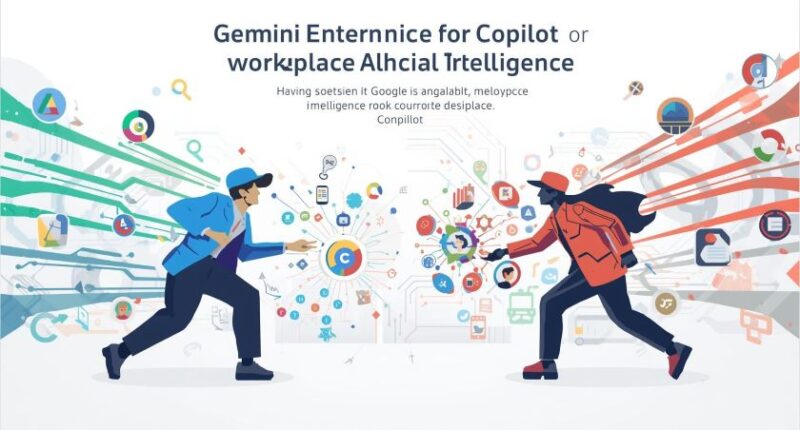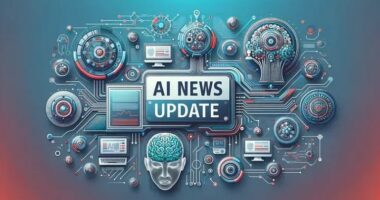The workplace is changing faster than ever, and artificial intelligence (AI) is at the center of that transformation. In 2025, two tech giants—Google and Microsoft—are leading the charge with their AI-powered productivity ecosystems. Microsoft has made waves with Copilot, its AI assistant integrated across Office 365. But Google has just unveiled its powerful response: Gemini Enterprise.
Gemini Enterprise isn’t just another chatbot or productivity tool—it’s Google’s vision of an intelligent AI agent on every desk, designed to revolutionize the modern workplace. But how does it stack up against Microsoft’s established Copilot system? Let’s dive deep into this new AI rivalry that could define the future of work.
The Rise of Workplace AI
Why AI Assistants Are the Future of Work
From automated scheduling to smart data analysis, AI assistants are becoming essential tools for productivity and efficiency. They’re not just responding to commands anymore—they’re thinking, reasoning, and assisting proactively.
Both Google and Microsoft are betting that the next big leap in productivity software will come from deeply integrated AI systems that understand business workflows, automate repetitive tasks, and help employees make better decisions.
In short, AI assistants are no longer add-ons; they’re becoming the core of enterprise productivity.
What Is Gemini Enterprise?
Google’s Next Big Leap in AI Integration
Announced in 2025, Gemini Enterprise is Google’s new flagship workplace AI platform built on its advanced Gemini 2.0 large language model. It’s designed to integrate seamlessly across Google Workspace—Docs, Sheets, Gmail, Meet, and Drive—while also connecting with third-party enterprise systems.
What sets Gemini Enterprise apart is its deep contextual understanding of your work environment. It doesn’t just respond to queries—it anticipates needs, summarizes meetings, generates reports, and even suggests strategic insights based on company data.
Key Features of Gemini Enterprise
-
Cross-Workspace Integration: Works across all Google apps and services.
-
Reasoning Engine: Built with improved logical reasoning and decision-making.
-
Enterprise-Grade Security: Integrates Google Cloud’s advanced privacy and compliance controls.
-
Natural Collaboration: Helps teams brainstorm, draft, and edit documents collaboratively in real time.
-
Custom AI Agents: Allows businesses to build personalized AI assistants for their teams.
Google’s goal? To make Gemini Enterprise the ultimate digital co-worker for every employee.
Microsoft Copilot: The Established Leader
How Microsoft Set the Standard for AI Productivity
Microsoft’s Copilot, powered by OpenAI’s GPT-4 and Microsoft’s own Azure AI models, was one of the first AI systems to seamlessly integrate into enterprise software. It’s embedded across Word, Excel, PowerPoint, Outlook, and Teams, giving users AI-powered help everywhere they work.
Copilot’s biggest strength lies in its deep integration with Microsoft 365. It helps users create documents, summarize meetings, generate emails, and automate complex spreadsheet operations—all within familiar interfaces.
Key Strengths of Microsoft Copilot
-
Native Integration: Flawlessly embedded in Microsoft 365.
-
Proven Reliability: Already deployed in thousands of global enterprises.
-
Strong Ecosystem: Backed by Azure, OpenAI, and Microsoft Graph for data intelligence.
-
Productivity Enhancement: Great at summarizing content, generating reports, and automating office tasks.
Microsoft has positioned Copilot as the AI brain of the workplace, giving employees superhuman efficiency.
Gemini Enterprise vs. Microsoft Copilot: A Head-to-Head Comparison
| Feature | Gemini Enterprise (Google) | Microsoft Copilot |
|---|---|---|
| Core Model | Gemini 2.0 LLM | GPT-4 + Azure AI |
| Ecosystem Integration | Google Workspace (Docs, Sheets, Gmail) | Microsoft 365 (Word, Excel, Outlook) |
| Data Access | Google Cloud, Vertex AI, Drive | Microsoft Graph, OneDrive, SharePoint |
| Customization | High — supports custom AI agents | Moderate — limited to Microsoft ecosystem |
| Collaboration Tools | Real-time document collaboration | Strong meeting tools via Teams |
| Security and Privacy | Built on Google Cloud’s enterprise-grade encryption | Enterprise security via Azure AD |
| AI Reasoning | Strong logical reasoning and multimodal capabilities | Excellent summarization and content generation |
| Pricing (Expected) | Subscription via Google Workspace Enterprise plans | Integrated into Microsoft 365 premium tiers |
Both systems excel in different domains. Copilot’s maturity and user base give it an early advantage, but Gemini Enterprise’s flexibility and multimodal AI design (understanding text, images, and even audio) could push it ahead in the long run.
Why Google’s Gemini Enterprise Could Change the Game
1. True Multimodal Intelligence
While Copilot primarily processes text and numerical data, Gemini Enterprise is built to understand text, images, voice, and video inputs simultaneously. This makes it more versatile in handling creative, design, and marketing workflows.
For example, you could upload a presentation image, and Gemini can generate matching text content—or even summarize a video meeting transcript into actionable notes instantly.
2. Deeper Integration with Cloud and Data Ecosystems
Gemini connects seamlessly with Google Cloud, BigQuery, and Vertex AI, giving businesses a powerful data analytics advantage. This allows enterprises to build custom AI-driven dashboards, automate reporting, and deploy tailored AI agents that fit their exact needs.
3. Cost and Accessibility
Because Google Workspace already has a massive user base, Gemini Enterprise could offer competitive pricing tiers, making AI-powered productivity accessible to more small and medium businesses (SMBs) than Microsoft’s premium-focused Copilot.
4. AI Agents on Every Desk
Google envisions a world where each employee has a personalized AI agent—an assistant that understands their role, priorities, and workflows. This personalization could redefine enterprise efficiency, turning Gemini into a virtual team member rather than just a tool.
Challenges and Limitations
For Gemini Enterprise
-
Late Entry: Microsoft Copilot already has a strong foothold in the enterprise AI market.
-
Adoption Hurdles: Businesses using Microsoft 365 may hesitate to switch ecosystems.
-
Training Data Restrictions: Google’s privacy policies may limit Gemini’s access to certain enterprise data compared to Copilot’s deep Graph integration.
For Microsoft Copilot
-
Limited Flexibility: It’s tightly tied to Microsoft products, making integration outside that ecosystem more complex.
-
Higher Costs: Premium AI features often require upgraded 365 plans.
-
Less Multimodal Support: Still catching up with visual and multimodal processing capabilities.
The Bigger Picture: The AI Race for the Workplace
The competition between Gemini Enterprise and Microsoft Copilot isn’t just about productivity—it’s about who will define the digital workplace of the future.
Microsoft’s Copilot represents the established, structured approach—reliable, enterprise-ready, and deeply integrated.
Google’s Gemini Enterprise represents the adaptive, intelligent vision—context-aware, multimodal, and built for the next generation of AI-driven work.
Both are shaping a world where AI assistants will handle routine work, freeing humans to focus on creativity, strategy, and innovation.
Conclusion: The Future of Work Is an AI Partnership
The launch of Gemini Enterprise marks a bold statement from Google: the company is ready to compete head-on with Microsoft for control of the AI workplace ecosystem.
While Microsoft Copilot remains the current leader in enterprise adoption, Google’s Gemini Enterprise offers a more flexible, multimodal, and forward-looking alternative—especially for businesses that value collaboration, scalability, and innovation.
In the end, the real winner will be the global workforce. As AI continues to evolve, tools like Gemini and Copilot will transform the way we work—making every desk smarter, every task faster, and every employee more empowered.









